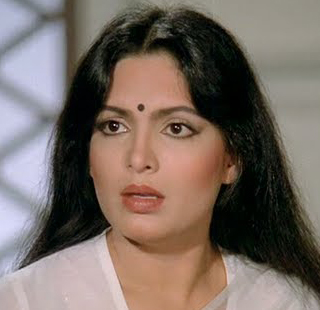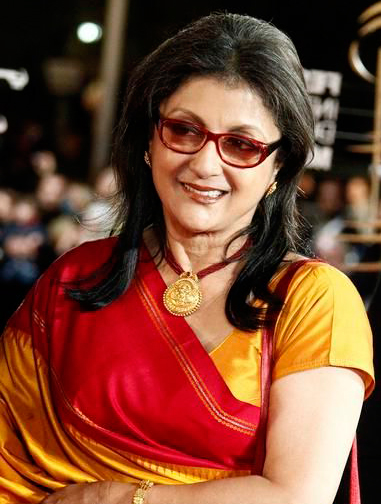Bollywood Masala Mix

Actress Parveen Babi was most remembered for her glamourous roles alongside top heroes of the 1970s and early 80s in blockbusters like Deewar, Namak Halaal, Amar Akbar Anthony and Shaan.
Parveen was born in Junagadh and did her early schooling in Aurangabad and later attended St. Xavier's College, Ahmedabad. Her father Vali Mohammed Babi, a Gujarati Muslim, was an administrator with the Nawab of Junagadh. Babi was born fourteen years after the marriage of her parents and was the only child.
Parveen did not marry but shared intimate relationships with married men: director Mahesh Bhatt, actors Kabir Bedi, and Danny Denzongpa. Parveen was also rumoured to have a relationship with her co-star Amitabh Bachchan. Mahesh Bhatt later wrote and directed Arth (1982), a semi-autobiographical film about his extramarital relationship with Babi, and wrote and produced Woh Lamhe (2006) based on actual facts about his relationship with her.
Parveen was considered to be one of the most successful Bollywood actresses in the 1970s and was known for her portrayal of iconoclastic women who did not care about the conventional norms of society. She made her film debut with film, Charitira, in 1973 while still in college.
She was the first Indian actress to have been featured on TIME magazine's cover, in March 1977. In her most successful films, she was paired opposite Amitabh Bachchan, who was one of the biggest stars of the decade, in cinematic blockbusters like Deewaar (1975) Amar Akbar Anthony (1977), Shaan (1980), Kaalia (1981), and Khud-daar (1982).
She was often compared with her contemporary Zeenat Aman due to their common image of being sex-symbols. In fact, she acted alongside Zeenat in Mahaan (1983) and Ashanti (1982) (inspired by the American television show Charlie's Angels, with the third role played by Shabana Azmi). In films like Deewar, Shaan and Namak Halaal (1982) her screen presence may have been minimal (the films largely working around the hero) but Babi brought a certain attractive aloofness to the roles and songs she appeared in. In Manoj Kumar's big hit Kranti (1981), she stole scenes with her supporting role from Hema Malini, the heroine of the film. Babi also acted in offbeat films like Vinod Pandey's Yeh Nazdeekiyan (1982).
Her success did not run into the mid-eighties as she had left the film industry to move to New York in 1983. Many of her completed films released in the following years right up until her last film releasing in 1988. In New York she became associated with the spiritual philosopher U. G. Krishnamurti.
She returned to Mumbai in 1992 where she was unrecognizable from her former self after having put on a considerable amount of weight. She accused many foreign dignitaries and her former co-star, Amitabh Bachchan, of conspiring to kill her but her petition in court was dismissed for lack of evidence. She also filed an affidavit in the special court hearing of the 1993 serial bomb blasts case, claiming that she had evidence to show, but she did not turn up in court after being summoned, saying that she was afraid of being killed.
It is speculated that Parveen Babi suffered from schizophrenia and had become a recluse due to her paranoia. It is also probable that she was not schizophrenic but had a Delusional Disorder DSM-IV TR and withdrew from society. It is probable that her mental disorder could be Substance-Induced Psychosis, as she allegedly took LSD and other hallucinogens with her lovers Kabir Bedi and Mahesh Bhatt - in addition to drinking heavily and also consuming marijuana. The move to New York was in order to obtain confidential psychiatric treatment, or perhaps partially motivated by the initial psychotic break - as she did not trust psychiatrists in India to keep her information confidential.
However, she managed to maintain her posh penthouse apartment in Mumbai and live affluently from sound financial investments. She was diabetic for most of her life - possibly due to the side-effects of powerful anti-psychotic medications.
She was found dead in her Mumbai apartment on January 20, 2005 after her residential society secretary complained to the police that she had not collected milk and newspapers from her doorstep for two days. She was found to have gangrene of the foot as a complication of her diabetic condition. The police ruled out any foul play. She was buried next to her mother at Santa Cruz, in Mumbai on January 23, after her funeral was held according to Islamic rites.

"Now this is fairly commonplace, but at that time I was in for a lot of flak. Halfway through the premier of the film, several young men came up to me and raised questions about my idea of women liberation. But some women thanked me in person for telling the story. After having finished making the film, I realised how the women in the country have been deprived," Sen said at a discussion.
"By going over the line to break these cliches about women, you always take that risk. But what is the alternative? Staying inside a box? That's no fun," she pointed out.
Taking the cue from Sen, film and theatre artist Ratna Pathak Shah, whose recent film Lipstick Under My Burkha courted controversy for its topic, blamed the country's popular media for representing women in a stereotypical way and said any unconventional story about women's aspirations or desire is still not well accepted.
"It is odd that Aparna ji was talking about such resistance while making women-centric films and it is a pity that we are still stuck in the same quagmire. Fighting over the stupidest things possible like cutting a line, a work, a gesture, a name or even an alphabet from a film," Shah said with an obvious reference to the censor board.
"The women in the country have always been represented as the Sati or Devi (the goddess). There was no exploration of woman as a person. If we can put out the idea of woman as epitomes of sacrifice, it is sold everywhere in India and the popular art is particularly guilty of that," she claimed.
Famous Bollywood filmmaker Vishal Bhardwaj, however, claimed that the condition of women in Indian film is changing. But he stressed the importance for men to come forward to put an end to suppression of women in the society.
"There was a time when the producers used to cut down the budget by 40 per cent in case of a woman-centric subject, but now things have changed. I think we as an industry are coming more towards equality in terms of gender," said Bhardwaj, who has made women-centric films like Saat Khoon Maaf.
"The suppression of women has been going on in society for a long time. I think the onus is on men to come out and protest against the suppression of women," he added.

Sunny, who has a huge fan following in India and around the world, will get her own wax statue at the famed museum.
Madame Tussauds' London team flew down to Mumbai to take specific measurements and photos of the actress in order to make the life-sized figure. Expressing her excitement, Sunny said that she is thrilled and grateful to Madame Tussauds for this gesture. She added that it was an overwhelming, unique and memorable experience for her as it was the first time she had undergone a sitting. She even thanked the team for the same and called it an incredible honour as Madame Tussauds is a 'one of a kind' attraction.